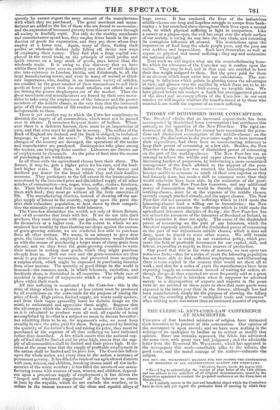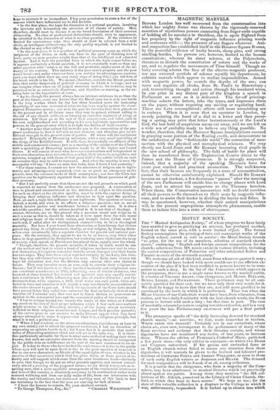THE CLERICAL ANTI-CORN-LAW CONFERENCE AT MANCHESTER.
UPWARDS of four hundred ministers of religion have intimated their intention to be present at this convocation. Our opinion of the movement is upon record ; and we have seen nothing in the writings of its apologists to incline us to retract or modify that opinion. Since our remarks appeared, the Globe has advocated the same view, with great tact and judgment ; and the admirable letter from the Reverend Mr. WICKSTEED, which has appeared in the newspapers this week—creditable alike to the talents, the gond sense, and the moral courage of the author—exhausts the subject.
THE REV. MR. WICESTEED'S REASONS FOR NOT JOINING THE CONFERENCE OF MINISTERS OF ALL DENOMINATIONS AGAINST THE CORN-LAWS.
Blenheim Square, Leeds, 4th August 1841.
" Sir—I beg to acknowledge the receipt of your letter of the 14th ultimo, and the address to the ministers of alt religious denominations, issued by the Committee appointed to conduct the proposed conference on the Corn-laws at Manchester.
"As I entirely concur in the just and beneficial object which the Committee have in view, and yet regard the particular kind of meeting by which they
hope to promote it as inexpedient, I beg your permission to state a few of the reasons which have influenced me to this decision. " In the first place, the topic for discussion is a national question, involving the interests and demanding the attention of all classes of society. Men, therefore, should meet to discuss it on the broad foundation of their common citizenship. No class of professional distinctions should, even in appearance, be admitted in the discussion of what is no class question. If the numbers be Emited for convenience sake, they should at least be selected from a wide circle, as intelligent philanthropy, the only quality required, is not limited to the clerical or any other calling.
" In the next place, it is a question of political economy--one on which the judgment of the divine, as such, can have in the eyes of thinking men of every party no more genuine weight than that of the intelligent and educated layman. And if, from the principal form in which the topic comes before us, it appears exclusively a bread question, it is not essentially more so than any other question which relates to the full and profitable employment of the in- dustry of the country. This industry is the poor man's property and the poor man's bread ; and under whatever form you restrict its advantageous exercise, (and you must allow there are very many ways of doing this,) you rob him of his bread, which is his life. We cannot, therefore, separate the Bread question from that entire framework of political economy to which it belongs ; and we can imagine crises when an ill.pdged monetary system, for instance, may be perceived to be as extensively disastrous, and therefore as starving, as the ex- isting laws on the importation of corn.
" Again, though the present always has an intenser existence to us than the past or the future, every one knows that the Bread tines ion is only one battle in the long warfare which for the last three hundred years the increasing knowledge of our true economical interests has been wag;ng against the short- sighted Protective system; and as in the past its victories have been gained, so in the present and in all future cases they may he gained, without calling in the aid of any church militant, or forming an exclusive regiment of clergy or ministers. Let them go as the rest of their countrymen, and inlist, each in his own neighbourhood and according to his oan legitimate opportunities and powers, in the general army which is to fight the battles of their country. "Another point that cannot fail to strike you in the composition of the pro- posed conference is, that it will add no new element, and therefore give no ad- ditional strength to the present state of parties. Of whom will the conference consist ? Principally of Dissenting ministers, with a very small sprinkling of the clergy of the Establishment. It will, then, be essentially an offshoot of the middle and commercial classes; just as a meeting of the ministers of the Church with a sprinkling of Dissenting ministers would be of the higher and landed classes. It will consist of men who, however conscientious and independent in their own characters, have nevertheless, as a fact, their interests, sympathies, and opinions, wrapped up with those of that great half of the nation which on such an occasion they may be said to represent. And when the meeting is over, the monopolist will say, • I have no more fear today than I knew I had yesterday.' " For these reasons, I cannot see how the ministers of religion can be legiti- mately and advantageously separated, even on so great an emergency as the present, from the common ranks of their countrymen ; nor how the Corn-law question can be legitimately separated from the other Bread questions of poli- tical economy. " But I am perfectly aware that these are not the real grounds on which good is expected to accrue from the conference now proposed. A convocation of men so placed and circumstanced as the ministers of religion in this country, for such an object as the circular specifies, must be with the express design of bringing their religious influence and character to bear upon-the question. Now, on such a topic this influence is not legitimate. The question at issue is, indeed, a moral, and even in its effects a religious question ; but so are all which involve justice and beneficence between man and man. It is also a scientific question ; but the science involved in it is not that of theology. I cannot, therefore, see on this ground why a question moral and religious in Such a sense as this is, should be taken as it were apart from the wide moral and religious heart of the whole nation, and brought before (what must be confessed, if called after its distinguished characteristic, to be) a theological assembly. Nor have I ever found from observation or from history that divines gained any thing in enlightenment, charity, or real religion, by forming them- selves even occasionally into a separate chamber for general and national pur- poses. -On the contrary, they appear to me to be as leaven, very bitter when taken in large quantities by themselves. but rendering more wholesome the lump of society, when spread, as Providence has placed them, equally over the whole.
" Though, therefore, the present occasion, if taken by itself, would be one of the noblest and best in which a band of religious teachers ever met to inte- rest themselves, it is right to remember that the sword thus put into their hands has two edges. They have been called together virtually by the Laity this time, but they may call themselves together the next. The Laity have chosen the topic for discussion Bow, but the Divines may exercise their own choice in future. They may hereafter meet, as now, only to exercise their religious in- fluence; but if two hundred or three hundred moderate and enlightened men can constitute a conference in 1841, influencing men of similar character, two hundred or three hundred hot .headed and ignorant men may equally consti- tute a conference in 1851, influencing men also of similar character ; and the firebrands that, while separate, a little local water can extinguish, when col-. lected in force and numbers it will require a very considerable accumulation of the cooler element to put out. I think the opponents of the Curn-laws should have paused before they called into existence the first exclusively clerical con- vocation (if 1 mistake not) that ever met in Great Britain to pronounce an opinion on the commercial laws and the economical policy of the country. " I fear to enlarge beyond due bounds the limits of this letter, or I should say much on the loss of their proper influence which I fear such convocations might occasion to the Dissenting ministry ; of the injury almost inevitably inflicted on their religious character and temper, and their peculiar pursuits; of the excuse given to our enemies to make Dissent appear what they have always attempted to make it appear—not what it is, a religious principle, but what it is not, a political one.
" When I bad resolved, on the above considerations, (satisfactory at least to my own mind,) not to attend the proposed conference, 1 had no intention of expressing an opinion hostile to it ; but I now find it is probable that multi- tudes of Dissenting ministers think and will act in the same way. It is there- fore particularly advisable for them to adopt some method of making their views known, lest such an extensive absence from the meeting should be interpreted by the public into an indifference on the part of the men summoned to its ob- ject. It is due to those who have invited the conference—it is due to the public whose eyes will now be upon it—it is due to the great question at issue—it is due to our own characters, as friends of the equal rights of men, whether in the exercise of that conscience which God has given them, or those powers of in- dustry and self-support which come from the same bounteous band—distinctly to aver, that though we do not on other grounds approve, and cannot consist- ently attend a meeting of the proposed nature, we are firmly convinced, as in quiring men, that a more equitable arrangement of the commercial intercourse and laws of this country is absolutely necessary to its continued or rather to its restored wellbeing and from our daily walks of life, from our intercourse with the worthy and industrious, but distressed working-men of this land, to bear our testimony to the fact that the poor are starving for lack of bread.
" I have the honour to remain, Sir, your obedient servant,



























 Previous page
Previous page